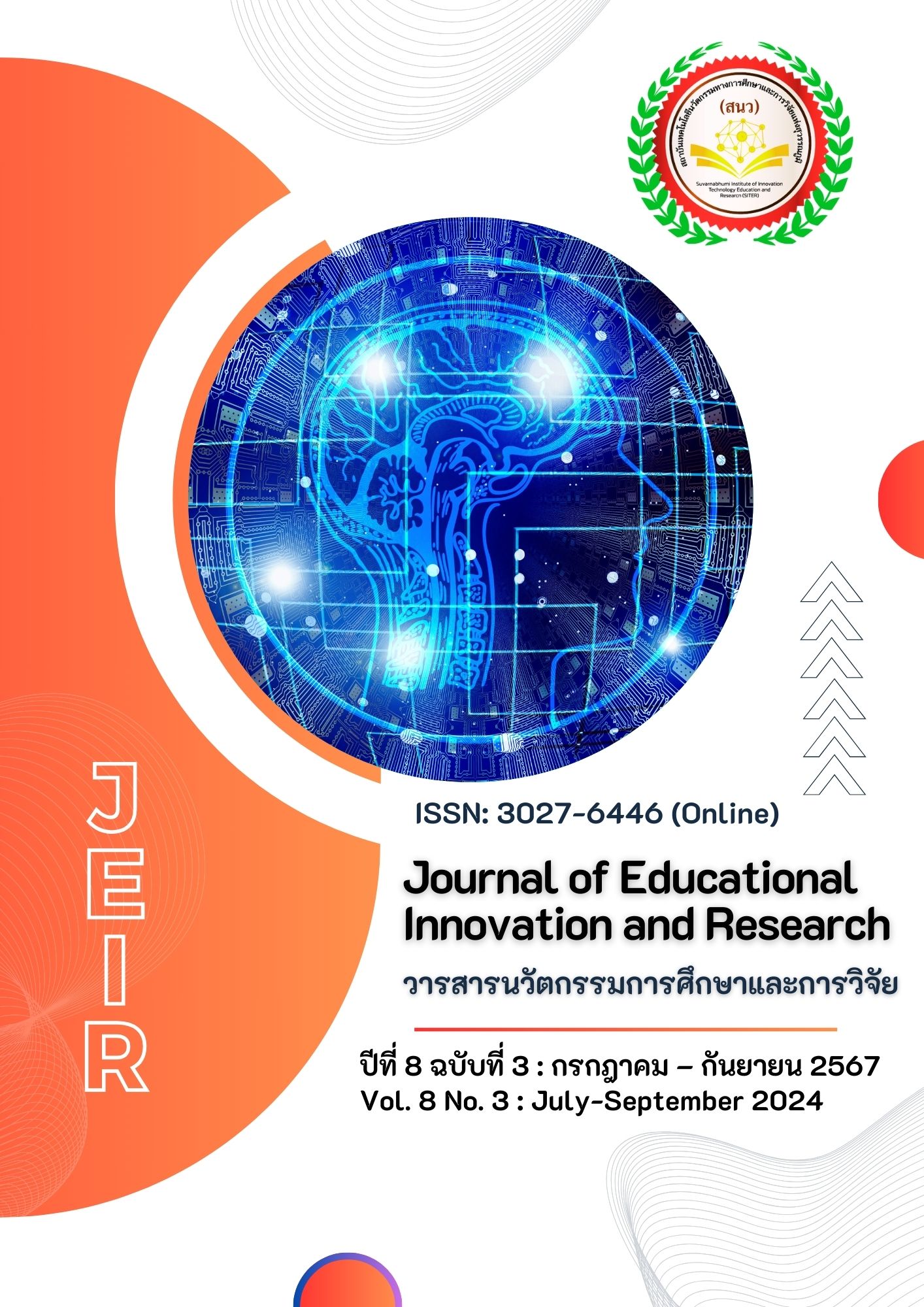กลยุทธ์การบริหารสถานศึกษาในยุคปกติใหม่
Main Article Content
บทคัดย่อ
การศึกษากลยุทธ์การบริหารสถานศึกษาในยุคปกติใหม่เป็นการสำรวจแนวทางและวิธีการที่สถานศึกษาใช้ในการปรับตัวต่อความเปลี่ยนแปลงที่เกิดขึ้นจากสถานการณ์โลก เช่น การแพร่ระบาดของโควิด-19 และการพัฒนาเทคโนโลยีสารสนเทศ เพื่อวิเคราะห์กลยุทธ์ที่มีประสิทธิภาพในการบริหารจัดการสถานศึกษาในบริบทใหม่ โดยมุ่งเน้นที่การสร้างความยืดหยุ่นในการเรียนการสอน การมีส่วนร่วมของผู้มีส่วนได้ส่วนเสีย และการพัฒนาทักษะของบุคลากร งานวิจัยนี้มีวัตถุประสงค์เพื่อทราบกลยุทธ์การบริหารสถานศึกษาในยุคปกติใหม่ วิธีการศึกษาวิจัยเชิงคุณภาพและเชิงปริมาณ โดยเก็บข้อมูลจากการสัมภาษณ์และการสำรวจความคิดเห็นของผู้บริหาร ครู และผู้ปกครอง ผลการศึกษาแสดงให้เห็นว่าการใช้เทคโนโลยีในการเรียนการสอน การสร้างความร่วมมือระหว่างชุมชน และการพัฒนาบุคลากรเป็นกลยุทธ์ที่สำคัญในการส่งเสริมการบริหารสถานศึกษาในยุคนี้ นอกจากนี้ การบริหารวิกฤตและการสร้างนวัตกรรมยังเป็นปัจจัยที่มีผลต่อความสำเร็จในการดำเนินงาน ดังนั้นงานวิจัยนี้เป็นการวิจัยเชิงอนาคต โดยใช้เทคนิควิธีวิจัยแบบ EDFR เครื่องมือที่ใช้ในการเก็บข้อมูลคือแบบสัมภาษณ์แบบไม่มีโครงสร้างและแบบสอบถาม รวบรวมข้อมูลโดยการสัมภาษณ์ผู้เชี่ยวชาญ 21 คน ใช้เทคนิคการคัดเลือกผู้เชี่ยวชาญแบบเจาะจงตามเกณฑ์ที่กำหนด สถิติที่ใช้ในการวิเคราะห์ข้อมูลประกอบด้วย ค่ามัธยฐาน (Median) ค่าฐานนิยม (Mode) และค่าพิสัยระหว่างควอไทล์ (Interquartile Range) และการวิเคราะห์เนื้อหา
ผลการวิจัย พบว่า กลยุทธ์การบริหารสถานศึกษาในยุคปกติใหม่ ประกอบด้วย 7 กลยุทธ์ 47 ประเด็น คือ 1) กลยุทธ์ด้านการพัฒนาบุคลากร 9 ประเด็น 2) กลยุทธ์ด้านการเปลี่ยนแปลงในอนาคต 9 ประเด็น 3) กลยุทธ์ด้านการจัดการ ICT 6 ประเด็น 4) กลยุทธ์ด้านวิชาการ หลักสูตร การสอน และการเรียนรู้ 8 ประเด็น 5) กลยุทธ์ด้านการเงินและงบประมาณ 5 ประเด็น 6) กลยุทธ์ด้านนโยบายยุคปกติใหม่ 6 ประเด็น และ 7) กลยุทธ์ด้านการบริหารทั่วไป 4 ประเด็น สามารถนำไปใช้เป็นแนวทางในการพัฒนากลยุทธ์การบริหารสถานศึกษาให้สอดคล้องกับความต้องการของสังคมและการเปลี่ยนแปลงทางเทคโนโลยี โดยมีเป้าหมายเพื่อพัฒนาคุณภาพการศึกษาและเตรียมความพร้อมสำหรับอนาคตที่ไม่แน่นอน
Article Details

อนุญาตภายใต้เงื่อนไข Creative Commons Attribution-NonCommercial-NoDerivatives 4.0 International License.
เอกสารอ้างอิง
Deeode, P. (2020). Educational alternative under the new normal: home schooling. Journal of Mahachulanak, 7, 11.
Greenb, T. (2019). Making strategy “Real : Using reality television for innovating teaching approaches. The International Journal of Management Education, 17, 13.
Hernandez, J. V. (2021). Strategic management in basic education institutions in Mexico. https://www.semanticscholar.org/paper/
Kousith, P. (2020). School Management Strategy under the jurisdiction of the Secondary Education Service Area Office in Northeast. Journal Academic of Thamatat, 20, 3.
Mjaku, G. (2020). Strategic Management and Strategic Leadership International. Journal of Scientific and Research Publications, 10, 8.
Mohd, F. (2019). Strategic Management and Strategic Planning in School: Is it worth for teachers. Academy of Strategic Management Journal, 18, 3.
Office of Foreign Relations Office of the Permanent Secretary, Ministry of Education. (2023). Preparing to deal with the reopening of schools after the Covid-19crisis. https://bic.moe.go.th/index.php/ gallery/2021-08-29-21-34-25/2360-covid-19-1-5-2563
Pongkitwiboon, S. (2020). Recognizing the likelihood of a crisis Destruction levels and communication strategies in crisis. Journal of Rambhaiphanni Research, 14, 2.
Savagpun, P. (2020). The new normal of a physical education classroom model with the covid 19 revolution. Journal of Education Naresuan University, 22, 3.
Sriwarom, K. (2018). Budget management strategies that are consistent with the context of higher education institutions Basic under the Bangkok MetropolitanAdministration.Journal of the educational research faculty of Education Srinakharinwirot University, 11, 2.
Tiemsuwan, W. (2020). Strategies for Administration of Catholic Basic Schools in the Archdiocese of Bangkok to the people of ASEAN. Journal of Sangtham College Academic, 12, 2.
Tongkaew, T. (2020). Educational design in the new normal life: impact of the covid-19 epidemic. Journal of the Teachers Council, 1(2), 1-10.
Dewey, J. (1938). Experience and Education. New York: Kappa Delta Pi.
Fullan, M. (2001). Leading in a Culture of Change. San Francisco: Jossey-Bass.
Senge, P. M. (1990). The Fifth Discipline: The Art & Practice of The Learning Organization. New York: Doubleday.
Friedman, T. L. (2005). The World Is Flat: A Brief History of the Twenty-First Century. New York: Farrar, Straus and Giroux.


